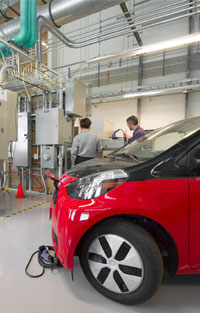Electric Vehicle Research and Development

The U.S. Department of Energy (DOE) is working with its partners in the public and private sectors to research, develop, demonstrate, and deploy technologies that enhance the performance of electric vehicles.
Environmental and Market Analysis
Electric vehicles (EVs) and hybrid electric vehicles (HEVs) offer reduced operating costs, fuel savings, and environmental benefits. For example, the National Renewable Energy Laboratory (NREL) and Idaho National Laboratory report, Levelized Cost of Charging Electric Vehicles in the United States, finds that driving an EV instead of a comparable conventional vehicle, can save a driver as much as $14,500 on fuel costs over 15 years. Additionally, Argonne National Laboratory’s (ANL) Autonomie model demonstrates that an all-electric vehicle is more than three times more efficient than its conventional counterpart. In Assessment of Light-Duty Plug-In Electric Vehicles in the United States, 2010-2019 (PDF), ANL estimates the electricity generation for the operation of an all-electric vehicle produces 53% less emissions than the tailpipe emissions from the operation of a gasoline vehicle.
Additionally, ANL’s An Extensive Study on Sizing, Energy Consumption, and Cost of Advanced Vehicle Technologies (PDF) report demonstrates significant improvements in fuel economy over time. By 2045, HEVs could achieve a 43% to 81% improvement in fuel economy and PHEVs could achieve a 73% to 96% improvement in fuel economy. In its National Economic Value Assessment of Plug-In Electric Vehicles (PDF), NREL uses a scenario approach to estimate costs and benefits of increased EV market growth across the United States. Under various EV adoption scenarios, NREL estimates a 22% to 36% decrease in greenhouse gas emissions.
Further, the widespread adoption of EVs will require a robust network of charging stations, from home-based AC charging to DC powered fast charging. Researchers are examining opportunities and impacts associated with a full range of charging technologies.
See the following resources for more information related to research in environmental and market analysis:
- Electric Vehicle Grid Integration
- Vehicle Electrification
- Transportation Energy Data Book: Edition 40 (PDF)
- National Economic Value Assessment of Plug-In Electric Vehicles (PDF)
- An Extensive Study on Sizing, Energy Consumption, and Cost of Advanced Vehicle Technologies (PDF)
- Cradle-to-Grave Lifecycle Analysis of U.S. Light-Duty Vehicle-Fuel Pathways: A Greenhouse Gas Emissions and Economic Assessment of Current (2015) and Future (2025-2030) Technologies


